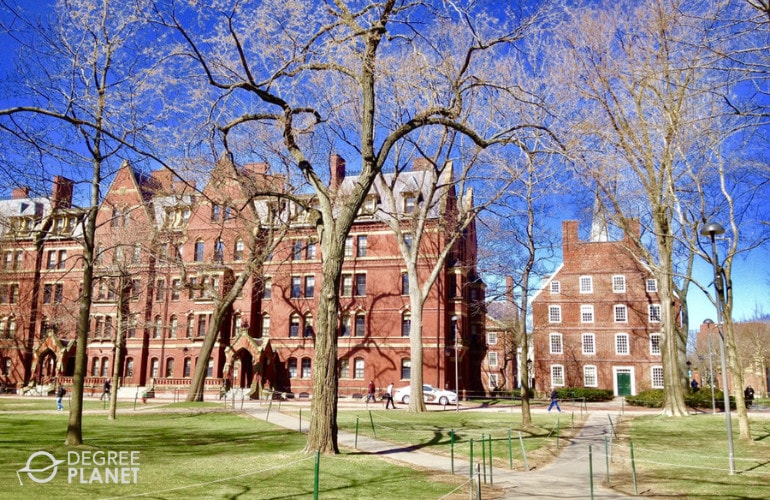Is it too late to go to college? Maybe it’s been years since you last went to school. You might think of college freshmen as 17-year-olds or 18-year-olds who are fresh out of high school.

In reality, though, schools are now seeing more adult learners across a wide range of ages, from 20 to as old as 98.
Editorial Listing ShortCode:
Going to college can have a lifelong impact—from increased career opportunities to personal growth—and you can reap these benefits at any age.
Is It Too Late to Go to College?

There is no age limit for going to college. Although the traditional track is to go to college right after high school, the path to college isn’t always so straightforward. While you might be nervous to start college late, know that you’re not alone.
Editorial Listing ShortCode:
Going to college as an adult is already a trend, with the figures steadily rising every year. There are more adult learners now than ever—including 24-year-olds who want to earn a diploma, career-changers in their 30s, and even seniors in their 70s and 80s.
There are several reasons why you might start attending college as an adult:
- To increase your earnings. Based on data from the Bureau of Labor Statistics, bachelors degree holders have much higher median earnings than high school graduates. Their unemployment rate is lower, and they’re more likely to have jobs with benefits, such as free childcare and health insurance.
- To get specialized training to further your career. Careers are evolving fast as technology becomes more advanced and competition gets fiercer on a global scale. To further your career, you may have to learn new skills. Going back to school can give you formal training and help you stand out among other candidates.
- To switch career fields. These days, the average adult will likely take on several careers during their lifetime. By going back to school, it might be easier to make the switch to a new field that’s better suited for you. Many careers require a bachelor’s degree, especially healthcare and engineering jobs that need a formal license.
- To formally study a subject that you’re passionate about. Aside from career-related reasons, you might want to go back to school simply to learn more about a subject that you love. College is considered a major life experience because it broadens your perspectives and exposes you to diverse people and mentors.
- To finish your degree and earn a diploma. Maybe you previously started your college degree but weren’t able to continue it. Maybe you only have the time or financial resources to go to college now. Either way, you can earn your college diploma at any age, and it’s an achievement that can stay with you throughout your life.
Whatever your reasons are, you can find a lot of people who can relate. Given the rise in adult learners, schools have adapted with more flexible options for students returning to college as an adult, like night classes and self-paced semesters. There are even online programs that cater specifically to non-traditional students.
Should I Go to College?

Going to college is a major decision, so you may want to consider the benefits along with what’s best for your current situation.
Most adults want to go back to school for career-related reasons. So, for example, it’s not at all unusual to see students starting college at 40. They might want to enhance their career, pursue a different kind of job, or increase their salary. The Bureau of Labor Statistics estimates that bachelors degree holders earn a median of $1,305 every week, which is almost twice that of the weekly median of $781 for high school graduates.
Many employers prioritize applicants with a bachelors degree, and there are also many entry-level jobs that require a bachelor’s degree. For instance, the majority of careers related to healthcare, finance, and engineering require bachelors-level training.
Editorial Listing ShortCode:
Some adult learners may want to go back to college so they can study something that they love, even if it’s not related to their career. Others might pursue a college degree simply because it’s a goal in their life. While college can be expensive, online programs are often more affordable than their in-person counterparts. An online degree program can also help you juggle your studies with work, family, and other commitments.
If you’re unsure about going to college, here are some questions that can help you decide:
- What is your main reason for wanting to go to college?
- If you want a career change, are there other ways of achieving your goals?
- Do you have the time and finances to sustain going to college as an adult?
- Are you ready to commit to a program for the next 4 years or so?
Thanks to online schools that have flexible schedules, more adults are going to college. For example, many programs allow you to study part-time, offering video classes that you can take from anywhere.
How to Go to College as an Adult

The process of going to college as an adult is fairly straightforward:
- Choose your college major. You can make a list of your choices of majors and research on graduate outcomes, especially for adults. What jobs are available to graduates, and what are the average salaries and usual working environments? This way, you can weigh whether studying a specific major is strategic or if you can pursue other kinds of training or do self-study instead.
- Decide on online or on-campus programs. To filter out your options, you can consider whether you’d want an online or on-campus program. Online programs are more common among adults because you can have more freedom to take them part-time. On the other hand, campus programs can provide a more immersive experience. There are accredited schools that offer both program options.
- Make a list of schools. Next, you can round up a list of schools that you can apply to. Accredited schools are more reliable in terms of quality of education, and they provide plenty of benefits. Some schools have specific application processes for adults, with perks such as flexible classes or child centers where your child can stay while you’re in class.
- Send in your applications. It’s strategic to try to prepare for school applications early. You’ll typically submit high school transcripts as well as transcripts of any college courses you’ve taken. You can check if there are other prerequisites for your prospective school, such as SAT scores or portfolios. If you’ve completed related classes or have relevant professional experience, it might be possible to get credit for them.
- Apply for financial aid. As an adult college student, you can still apply for government loans and grants through the Free Application for Federal Student Aid (FAFSA). Your employer might even be willing to shoulder some of the costs, especially if the major you’re pursuing is related to your current job. You can look out for scholarships and sponsorships as well.
Preparing the required documents for your application packet is often the most time-consuming step in the process, so it’s beneficial to leave yourself enough time for that step.
Typical Bachelor’s Admissions Requirements

When you’re applying for a bachelor’s degree, you’ll typically be expected to have these documents:
- High school transcripts. Schools use these transcripts to confirm that you’ve graduated from high school.
- Other transcripts. If you’ve taken any college classes before, you’ll submit the transcripts for them so they can be considered for credit.
- References. You can choose people you’ve worked with recently as your references.
- Personal essay. Some schools will be interested in why you are choosing to start or to go back to school.
Most schools don’t require SAT or ACT results from adult learners, but this depends on the school.
Accreditation

When you’re choosing a college program, it’s strategic to check whether or not the school is regionally accredited.
Going to an accredited school means that other institutions and future employers will recognize your degree as credible. You’ll also be able to apply for government financial aid. In addition, if you decide to transfer schools, accreditation makes it more likely that your credits will be eligible for transfer.
Editorial Listing ShortCode:
For a school to be accredited, it needs to go through a thorough evaluation that’s based on strict educational standards. The US Department of Education has a list of accredited schools across the US as well as a list of approved accrediting organizations.
Is Financial Aid Available?

Even as an adult, you still have several options for financial aid as you pursue a college degree. Undergraduate students can apply for government financial aid by filling out the Free Application for Federal Student Aid (FAFSA). Your FAFSA application can determine your eligibility for student loans and grants.
Another option is to seek tuition assistance from your employer. Employers may offer education benefits, from shouldering part of your tuition to allowing you to adjust your work schedule so you can take classes. The catch is that you might be required to stay with the company for a certain number of years.
You can apply for scholarships as well. Scholarships usually have no age limit, and there are even scholarships specifically intended for adults who go back to school. Private loans may be available too, especially if you have a good credit history.
Can You Go to College at Any Age?

As an adult, you might be wondering, “Is it ever too late to go to college?” “What age do you go to college?” There’s actually no maximum age for applying to college.
Most schools do have a minimum age limit of 15 or 16 years old, but this can be waived based on discussions with guardians or teachers. Because there’s no maximum age, many schools these days have students with a wide range of ages. The most common freshman age is still 17 to 18, but non-traditional students from 24 years old up to senior age can attend college.
When Is It Too Late to Go to College?
It’s never too late to go to college. Nearly half or more of undergraduate students in the US are older than 25 years old. The record for the oldest students to have graduated from college is currently at 98 and 99 years old.
After all, learning should be lifelong, and many adults experience life changes that motivate them to go back to school. There are more options than ever, such as evening classes and online programs, that cater to adult students who have other commitments.
Is 24 Too Old to Go to College?

If you are 24, you are not too old for college. Some schools consider non-traditional students to be at least 25 years old, so you might not even be considered an “older” student at 24. Besides, traditional senior students would be around 22 years old, which isn’t too far off.
At 24, you have most of your working life ahead of you. Going to college may help you set your career direction early on and give you an advantage in terms of opportunities.
Is 25 Too Old for College?
If you’re going to college at 25, you’ll be one of the youngest non-traditional students around. Many non-traditional students are in their 30s or 40s and beyond, so attending college at 25 is definitely possible.
As a 25-year-old, you’ll still be at the starting point of your career. By going back to school for a college degree, you might qualify for more jobs with a higher earning potential. Since you’ve had more time to get to know yourself, you might also have a better understanding of your strengths and a clearer idea about what to major in.
Is Going to College at 30 Too Late?

Thirty is not too late to go to college. Some older students are starting college at 30 and above. Some online bachelor’s programs even have an average age that is higher than 30 years old.
More people are now pursuing education as adults, especially since careers are evolving rapidly and retraining might be needed to enter a new career. Alternatively, getting a bachelors degree might help you advance in your current career.
Editorial Listing ShortCode:
Many college programs are more adaptable now for 30-year-olds who are working or who have a family. For example, you could consider taking classes during evenings, on weekends, or online.
How Long Does It Take to Get a College Degree?

If you’re starting from scratch, a college degree will generally take 4 years to finish with full-time studies. Online programs tend to offer shorter 8 week classes that you can take back to back. A growing number of universities even offer accelerated degrees for adults. Those who take this route may finish sooner if they enroll full-time and study year round.
Adult students often study part-time, which often adds to your time to completion. How long it takes you will likely depend on how many credits you take per year. If you’ve taken college classes before or have related work experience, you might be able to get credits for them, which could reduce the number of classes you have to take. You can also skip summer breaks and study all year round to finish faster.
Is College Worth It?
Yes, college is worth it for many students. A college degree can improve your career prospects. According to the Bureau of Labor Statistics, the median weekly earnings for those with a bachelor’s degree is more than 60% higher than the median earnings for high school graduates.
Editorial Listing ShortCode:
Bachelor’s degree holders also have a much lower rate of unemployment, and they’re more competitive candidates for higher-paying jobs. Some careers, such as accountant or K-12 teacher, are only possible with a bachelor’s degree. At the same time, college can be a very enriching experience that encourages you to grow as a person as well as a professional.
Getting Your College Degree Online

Getting a college degree can be a life-changing decision. Pursuing a bachelors degree can help you grow your skills, get excited about learning, and expand your mindset.
With a college degree, you might even be able to enter into a new career field or advance further in your existing career. Online programs are often strategic options for adult learners who want more convenient schedules as they balance their studies with other responsibilities.
You can start exploring accredited schools today to get set for the next stage of your journey!

